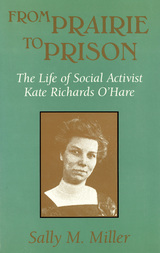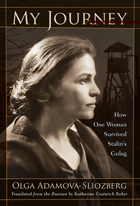3 books about Women political prisoners

From Prairie to Prison
The Life of Social Activist Kate Richards O'Hare
Sally M. Miller
University of Missouri Press, 1993
This is the first full-length biography of the woman who crusaded tirelessly for women, workers, and children, and became the most celebrated socialist woman from the West.
[more]

My Journey
How One Woman Survived Stalin's Gulag
Olga Adamova-Sliozberg
Northwestern University Press, 2011
This is the first English translation of Olga Adamova-Sliozberg’s mesmerizing My Journey, which was not officially published in Russia until 2002. It is among the best known of Gulag memoirs and was one of the first to become widely available in underground samizdat circulation. Alexander Solzhenitsyn relied heavily upon it when writing Gulag Archipelago, and it remains the best account of the daily life of women in the Soviet prison camps.
Arrested along with her husband (who, she would much later learn, was shot the next day) in the great purges of the thirties, Adamova-Sliozberg decided to record her Gulag experiences a year after her arrest, and she “wrote them down in her head” (paper and pencils were not available to prisoners) every night for years. When she returned to Moscow after the war in 1946, she composed the memoir on paper for the first time and then buried it in the garden of the family dacha. After her re-arrest and seven more years of banishment to Kazakhstan, she returned to the dacha to dig up the buried memoir, but could not find it. She sat down and wrote it all over again.
In her later years she also added a collection of stories about her family. Concluding on a hopeful note—Adamova-Sliozberg’s record is cleared, she re-marries a fellow former-prisoner, and she is reunited with her children—this story is a stunning account of perseverance in the face of injustice and unimaginable hardship. This vital primary source continues to fascinate anyone interesting in the tumultuous history of Russia and the Soviet Union in the twentieth century.
Arrested along with her husband (who, she would much later learn, was shot the next day) in the great purges of the thirties, Adamova-Sliozberg decided to record her Gulag experiences a year after her arrest, and she “wrote them down in her head” (paper and pencils were not available to prisoners) every night for years. When she returned to Moscow after the war in 1946, she composed the memoir on paper for the first time and then buried it in the garden of the family dacha. After her re-arrest and seven more years of banishment to Kazakhstan, she returned to the dacha to dig up the buried memoir, but could not find it. She sat down and wrote it all over again.
In her later years she also added a collection of stories about her family. Concluding on a hopeful note—Adamova-Sliozberg’s record is cleared, she re-marries a fellow former-prisoner, and she is reunited with her children—this story is a stunning account of perseverance in the face of injustice and unimaginable hardship. This vital primary source continues to fascinate anyone interesting in the tumultuous history of Russia and the Soviet Union in the twentieth century.
[more]

Women Political Prisoners in Germany
Narratives of Self and Captivity, 1915-91
Kim Richmond
University of London Press, 2016
One of the few major enquiries into women’s narratives of political incarceration, this volume examines first-person accounts written against a backdrop of momentous historical events in twentieth-century Germany. Rosa Luxemburg’s prison letters are the starting point for the study, which explores the ways in which writing is used as a response to incarceration: how does the writer ‘perform’ femininity within the de-feminizing context of prison? How does she negotiate a self-representation as a ‘good’ woman? Central to this investigation is an awareness of the role of language as a means of empowerment within the disempowering environment of prison. As a key female political figure in twentieth-century Germany, Luxemburg wrote letters from prison that encapsulate prevalent notions about womanhood, prison, and political engagement that are perceptible in the subsequent texts of the study. The diaries of Luise Rinser and Lore Wolf from National Socialist prisons show, in different ways, how the writer uses language to ‘survive’ prison, whilst Margret Bechler’s and Elisabeth Graul’s retrospective accounts of GDR incarceration give insight into the elastic concept of both the political prisoner and the ‘good’ woman. All narratives provide examples of the role of language in resisting an imposed identity as ‘prisoner’, ‘criminal’, and object of the prison system. Kim Richmond completed her PhD at the University of Edinburgh and is now an Associate Lecturer in Languages at the Open University.
[more]
READERS
Browse our collection.
PUBLISHERS
See BiblioVault's publisher services.
STUDENT SERVICES
Files for college accessibility offices.
UChicago Accessibility Resources
home | accessibility | search | about | contact us
BiblioVault ® 2001 - 2024
The University of Chicago Press









